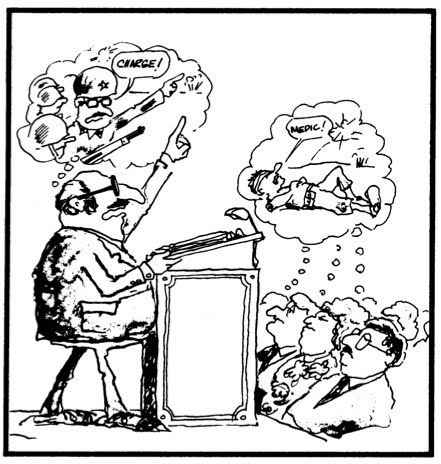Jonathan Edwards’ preaching has been compared to the work of an artillery man. Edwards, it is said, would use his doctrinal exposition to set up his guns. The rest of his sermon would consist in firing them.
If you have read Edwards’ most famous sermon, “Sinners in the Hands of an Angry God,” you will know this to be true. The version I have is 7,174 words long, of which 2,768 words are devoted to the explication of the doctrine. Over 60% of the sermon is devoted to applying it to his hearers. There is little question that his hearers knew what response he was seeking from them, if this last paragraph is any indication:
“Therefore, let every one that is out of Christ, now awake and fly from the wrath to come. The wrath of Almighty God is now undoubtedly hanging over a great part of this congregation. Let every one fly out of Sodom: ‘Haste and escape for your lives, look not behind you, escape to the mountain, lest you be consumed.’”
The analogy suggests that the art of preaching is one of carefully loading and positioning our guns with truth that is suited to the target, and then firing them with intensity and precision.
Some of us load our guns with great doctrine, but never have the time (or will) to fire them. Some of us fire the guns, but do so aimlessly, not hitting any target within reach. And some of us fire marvelously and have a great aim, but we’ve loaded our guns with marshmallows.
I am convicted by this. I am like the young boy who goes hunting, and the game enjoy his hunting trip as much as he does, for they know there is no possible danger of any damage being done! A sermon is not complete if the preacher has not pondered the what and who and how of application.
Why do we preach at all? Is it to entertain? If so, our aim is easily attained, but it is a shallow goal. What is our aim? Is it to educate and inform? To make our listeners more biblically and doctrinally literate? Of course. This is a noble purpose of expounding God’s word. But to what end? If we leave simply smarter, we have really gained little.
What is the purpose of our preaching? One hour of preparation is needed for every 3 to 5 minutes of actual sermon. Toward what end are we investing such time? The aim will be revealed in how the preacher applies his sermon. What we are attempting to accomplish in the preaching will be reflected in what we tell the hearer to DO with the truth just expounded. If we omit pointed application, we are either ONLY interested in inflating our hearer’s knowledge, or we are lazily leaving the task of application to them.
I’ve been guilty of both.
Our sermons must from beginning to end be concerned for the hearts and wills of those to whom we preach. Yes, we are concerned to change their way of thinking. But that in and of itself is not sufficient application, if we do not at the same time help them see how this change of thinking makes them of better usefulness in the kingdom.
Certainly we are concerned to see men and women come to Christ. Charles Simeon said that each sermon should humble the sinner, exalt Christ, and promote holiness. All of this is very general, but better than no aim at all.
When one takes to firing guns, and not just loading them, people can get hurt. I’ve often reflection on how it can be a frustrating thing to preach and find that no one is listening. It is, however, a scary thing to know that they are.


